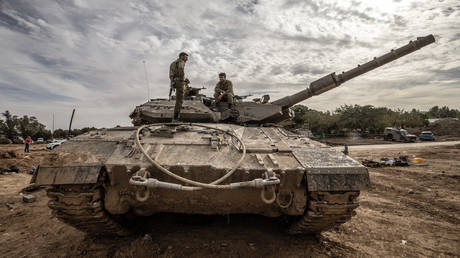
War with Hamas damaging Israel’s economy – Moody’s
The country spends $270 million a day on the military campaign in Gaza, according to the credit rating agency
The war with the Palestinian militant group Hamas is costing Israel at least $269 million a day and is expected to hit the country’s economy harder than previous conflicts, ratings agency Moody’s has said in a report based on Israeli Finance Ministry estimates.
The overall cost of the war could reach as much as 200 billion shekels ($53.5 billion), nearly 10% of GDP, threatening Israel’s economic future, the Moody’s report revealed this week, citing data from the Institute for National Security Studies (INSS).
“The severity of any damage to the economy will depend – to an important extent – on the length of the military conflict but also on the longer-term prospects for Israel’s domestic security situation,” Moody’s senior VP Kathrin Muehlbronner said.
For Israel, much of the economic shock will come from reduced investments, disruptions in the labor market, and slowing growth of productivity, economists warn.
“While the uncertainty remains very high, we believe that the impact on the economy could be more severe than in earlier episodes of military conflict and violence,” Muehlbronner added.
According to Moody’s, the financial burden for Israel will be much higher than that of previous military operations, such as Protective Edge in 2014, or the Second Lebanon War in 2006, which lasted 34 days and incurred a direct cost of around $2.5 billion, or 1.3% of GDP.
Read more
Israel headed for sharp economic downturn – S&P
A looming economic downturn prompted Moody’s to revise downwards its growth forecast for the Israeli economy from the 3% previously expected to 2.4% this year. In its pessimistic 2024 outlook, the ratings agency sees GDP contracting by about 1.5%.
The agency, which placed Israel’s A1 credit rating on review for a possible downgrade, also predicted that a prolonged conflict would force the government to spend billions of shekels on defense, including the wages of thousands of drafted reservists. Massive spending will also include funding for compensation for war-affected businesses and the reconstruction of devastated communities.
Meanwhile, state revenues, mainly tax income, will continue to slump as consumption, among other demand factors, is plummeting, with the absence of around 18% of Israel’s workforce during the war.
For more stories on economy & finance visit RT’s business section


